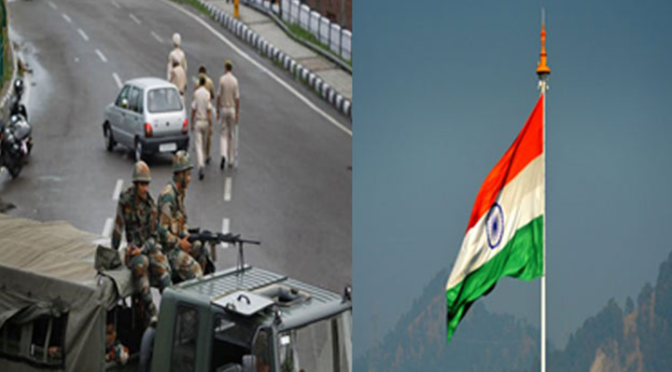A Government desperate to curb “terrorism” or a nation repeating its colonial past?
Posted on : August 12, 2019Author : AGA Admin

In the aftermath of an unprecedented lockdown on Kashmir from 4th August, the entire political fabric of India, and democracy to some, has changed dramatically that is expected to have an enduring impact on its constitution, foreign relations, economic affairs, and most importantly, its citizens.
The situation marked by unqualified confusion and unmitigated panic began from the preceding week when the Jammu and Kashmir administration was prompted to curtail the Amarnath Yatra after the Indian Army claimed that Pakistani terrorists were plotting to carry out an attack on the ongoing pilgrimage and that the security forces had recovered a Pakistan Ordinance factory anti-personnel mine from a terror cache. The curtailment of the Amarnath yatra and evacuation of pilgrims was in itself an unprecedented move that evoked multiple queries throughout the nation and was met with feeble responses of “fighting terrorism”, citing “intelligence inputs” of terror threats especially targeting the Amarnath yatris. The advisory read, “Keeping in view the latest intelligence inputs of terror threats, with specific targeting of the Amarnath yatra, and given the prevailing security situation in the Kashmir Valley, in the interest of safety and security of the tourists and Amarnath Yatris, it is advised that they may curtail their stay in the Valley immediately and take necessary measures to return as soon as possible.”
The situation became even more confounding when under the absence of a state government (Kashmir has been under governor’s rule and then President’s rule since last June) Section 144 of the Code of Criminal Procedure was issued and restrictions were imposed, which would continue to remain in force until future orders, banning any kind of public meeting, rallies or assemblies of more than 5 people at a time. The popular leaders of the state like Mehbooba Mufti, Omar Abdullah and Sajjad Lone were put under house arrest and the people of J&K were virtually cut off from the rest of the Indian state, as all mobile, broadband internet and cable TV services were suspended in Srinagar. All public institutions were shut with students from outside the state instructed to leave.
Without offering an explanation, the government ordered the deployment of additional troops in the state with the number going up to 350,000 extra army personnel. On 5th August, there were ripples of shock throughout the nation as the Government of India announced it was neutering Article 370 that had granted Jammu & Kashmir special status emanating from the Bilateral Treaty (1949) to which the political representative of Kashmir had granted consent in its accession to India.
With plans to create two new Union Territories, Ladakh and Jammu & Kashmir, the state has been disintegrated without the consent or even the cognizance of its inhabitants. The virtual neutering of Article 370 and revocation of Article 35A stripped the citizens of all the special privileges they were privy to by the very definition of being the “permanent residents” of J&K.
It can be argued that the restrictions imposed on J&K cannot be read in isolation as successful amendments to the Unlawful Activities (Prevention) Act, the National Investigation Agency (Amendment) Bill and the Jammu & Kashmir Reservation Bill in succession along with the UAPA Bill manifestly indicates a pattern that may not augur well for Indian democracy.
Article 370 makes it clear that for the President to notify the removal of the provision or modify it, the recommendation of the Constituent Assembly of Jammu and Kashmir is necessary. The Constituent Assembly of the state was dissolved in 1956. The legislative assembly of J&K took over the power of making recommendations but as J&K is currently under governor’s rule, the parliament has assumed the powers of the state assembly. With the parliament acting on behalf of the J&K assembly, the attempt to propose a bill and change the character of the state did not have to contend with any deterrent.
Quite naturally, a large section of the people of Kashmir and its former elected representatives are opposed to changes in the special status. In this context, the Centre’s decision can be construed as a full-fledged attack on the federal structure of the Indian state and the wishes of the people of Kashmir.
The Supreme Court is expected to step in because of the very sensitive nature of the prevalent circumstances and the nuanced interpretation of the law and the constitution that it necessitates. They will have to decide if the abrogation falls under the “basic structure” of the constitution, and if it does, the parliament “cannot” interfere with that.
Besides, the constitutional irregularities involved in what may be termed as a ground-breaking decision, the very fact that it was made without the informed choice or consent of the citizens whose lives will be directly affected by it, does make a dent in India’s democratic traditions. At a time, when the people of Jammu and Kashmir have no means to connect with the outside world and articulate their voices of dissent, the unilateral decision of the government of India may be labelled as an act of “colonization.” For a nation which has been colonized for almost 200 years, one would perhaps not expect a replication of the past, especially, in which it assumes the role of a colonizer.
The long term ramifications of “scuppering the essence of Article 370” on the social and political fabric of J&K as well as its impact on the democratic character of the state of India remains to be seen as events unfold in the aftermath of the reversion to “normalcy.” A safe contention would be that it is indeed for the first time in the history of independent India that a state has been downgraded to a union territory, on the grounds of preservation of national security, elimination of corruption and to usher in an era of development perhaps connoting an “idea of a new India” premised on the efficacy of governance.
Sukanya Bhattacharya
Intern, AGA
The opinions expressed in this article are the personal opinions of the author and do not reflect the position of AGA.





Leave a Reply